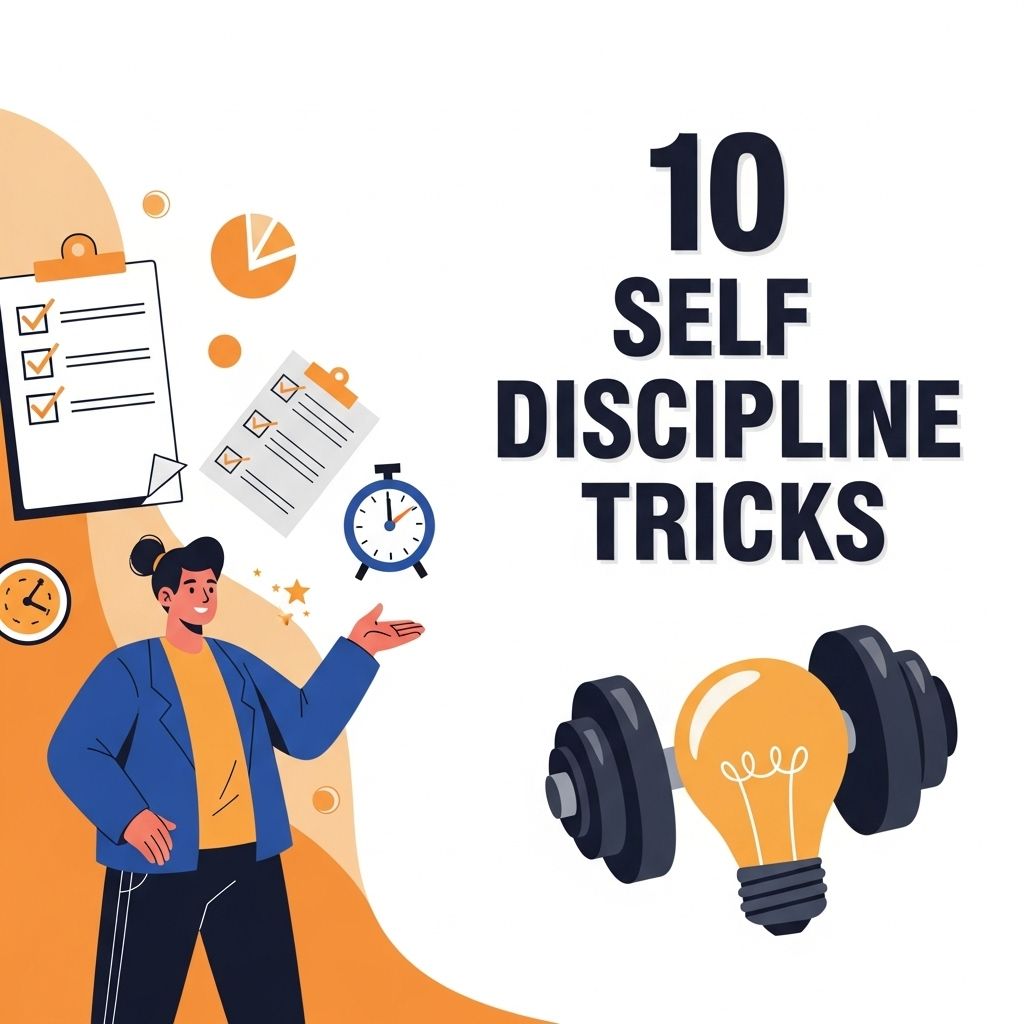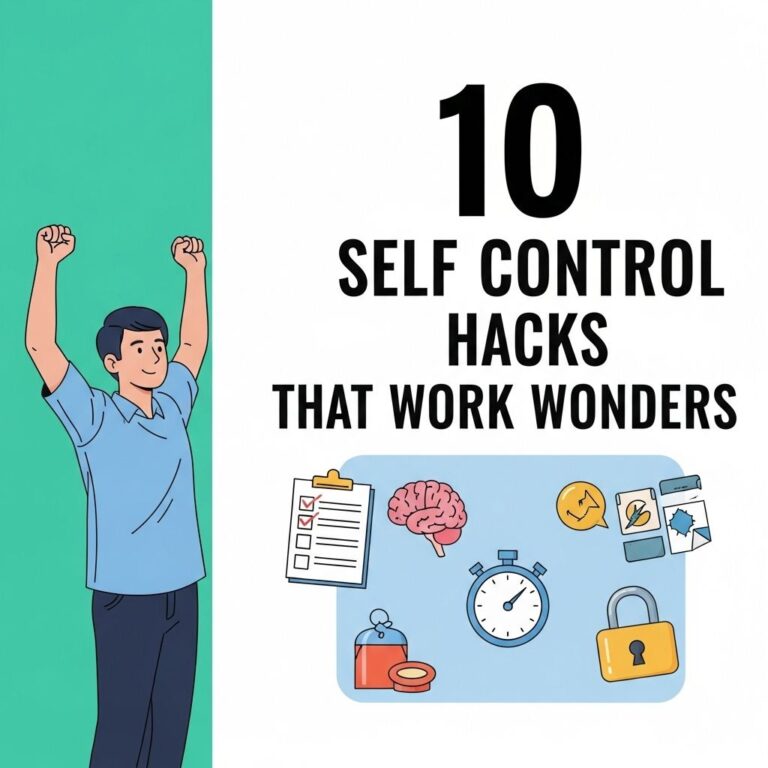In a world buzzing with distractions and constant demands on our time, self-discipline stands out as a transformative quality. It allows us to navigate through the noise and maintain focus on our goals, ultimately leading to personal and professional success. Whether you’re looking to improve your productivity, enhance your health, or achieve your dreams, mastering self-discipline is key. Below, we delve into ten powerful tricks that can significantly enhance your self-discipline and help you lead a more organized and fulfilling life.
Table of Contents
Understanding Self-Discipline
Before we explore the tricks to enhance self-discipline, it’s essential to understand what self-discipline truly means. It’s not merely about exercising willpower to resist temptations; it’s about creating a framework for making consistent, positive choices aligned with your long-term objectives.
What Self-Discipline Is Not
- It’s not about being overly restrictive or punishing oneself.
- It’s not merely about following rigid routines.
- It’s not an innate trait limited to a select few.
Trick #1: Set Clear Goals
The foundation of self-discipline is well-defined goals. Having a clear understanding of what you want to achieve will direct your focus and efforts.
SMART Goals Framework
Utilize the SMART criteria to formulate your goals:
- Specific: Clearly define what you want to achieve.
- Measurable: Outline how you will measure progress.
- Achievable: Ensure your goals are realistic.
- Relevant: Align goals with your broader ambitions.
- Time-bound: Set a deadline for accomplishment.
Trick #2: Develop a Routine
Creating a structured daily routine can significantly boost your self-discipline. Routines automize your actions and reduce decision fatigue.
Key Components of a Successful Routine
- Morning rituals: Start your day with activities that energize and motivate you.
- Work blocks: Allocate specific time slots for focused tasks.
- Evening wind-down: Set aside time to reflect on the day and prepare for tomorrow.
Trick #3: Eliminate Distractions
Distractions are the enemies of self-discipline. Identifying and minimizing them can make a remarkable difference in your ability to stay focused.
Strategies to Reduce Distractions
| Distraction | Solution |
|---|---|
| Smartphone notifications | Turn off non-essential alerts or use ‘Do Not Disturb’ mode. |
| Social media | Limit usage to specific times of the day. |
| Cluttered workspace | Organize your desk and remove unnecessary items. |
Trick #4: Practice Mindfulness
Mindfulness enhances your awareness and control over your impulses. Practicing mindfulness techniques can train your brain to resist distractions and maintain focus.
Mindfulness Techniques
- Meditation: Spend 5-10 minutes daily in meditation.
- Deep breathing: Use deep breathing exercises when feeling overwhelmed.
- Journaling: Reflect on your day and document your thoughts.
Trick #5: Use Positive Reinforcement
Rewarding yourself for achieving milestones can reinforce positive behavior and increase motivation.
Effective Reward Strategies
- Set mini-goals within larger objectives and reward yourself upon completion.
- Choose rewards that align with your goals (e.g., a healthy treat for a fitness milestone).
- Share your accomplishments with others for social reinforcement.
Trick #6: Stay Accountable
Accountability boosts commitment and adherence to your goals. Sharing your goals with someone can create a sense of responsibility.
Accountability Methods
- Find a buddy: Partner with someone who shares similar goals.
- Join a community: Engage in groups that focus on your area of interest.
- Use apps: Utilize productivity apps that track your progress.
Trick #7: Embrace Failure as a Teacher
Fear of failure can hinder self-discipline. Embracing setbacks as opportunities to learn enhances resilience and persistence.
Learning from Failure
- Analyze what went wrong and identify patterns.
- Adjust your approach based on insights gained.
- Maintain a growth mindset to foster resilience.
Trick #8: Break Tasks into Smaller Steps
Large tasks can be overwhelming and lead to procrastination. Breaking them down into manageable steps can increase your ability to stay disciplined.
Chunking Method
- Identify the main task.
- Break it down into smaller, actionable steps.
- Schedule each step on your calendar.
Trick #9: Prioritize Self-Care
Physical and mental well-being directly impact your ability to exercise self-discipline. Prioritizing self-care can enhance your focus and motivation.
Self-Care Strategies
- Exercise regularly to boost energy levels.
- Maintain a balanced diet that fuels your body.
- Ensure adequate sleep for optimal brain function.
Trick #10: Reflect and Adjust
Regular reflection on your progress allows you to make necessary adjustments. It helps you understand what works and what doesn’t.
Reflection Practices
- Set aside time weekly to review your progress.
- Ask yourself what strategies were effective and what needs change.
- Document insights in a journal for future reference.
Conclusion
Enhancing self-discipline is a continuous journey requiring commitment and practice. Implementing these ten tricks can significantly transform your life, leading you to achieve your goals with greater ease and fulfillment. Remember, self-discipline is not about perfection but about making consistent, positive choices that align with your aspirations.
FAQ
What are self-discipline tricks?
Self-discipline tricks are techniques or strategies that help individuals maintain focus, resist temptations, and achieve their goals effectively.
How can I improve my self-discipline?
You can improve self-discipline by setting clear goals, creating a structured routine, practicing mindfulness, and gradually increasing your self-control through small challenges.
What role does motivation play in self-discipline?
Motivation provides the initial drive to pursue goals, but self-discipline is what keeps you on track even when motivation wanes.
Can self-discipline be learned?
Yes, self-discipline can be learned and strengthened over time through consistent practice and dedication to personal growth.
What are some common obstacles to self-discipline?
Common obstacles include procrastination, distractions, lack of motivation, and negative self-talk.
How can I stay motivated to practice self-discipline?
You can stay motivated by tracking your progress, celebrating small wins, finding an accountability partner, and reminding yourself of the long-term benefits of self-discipline.









